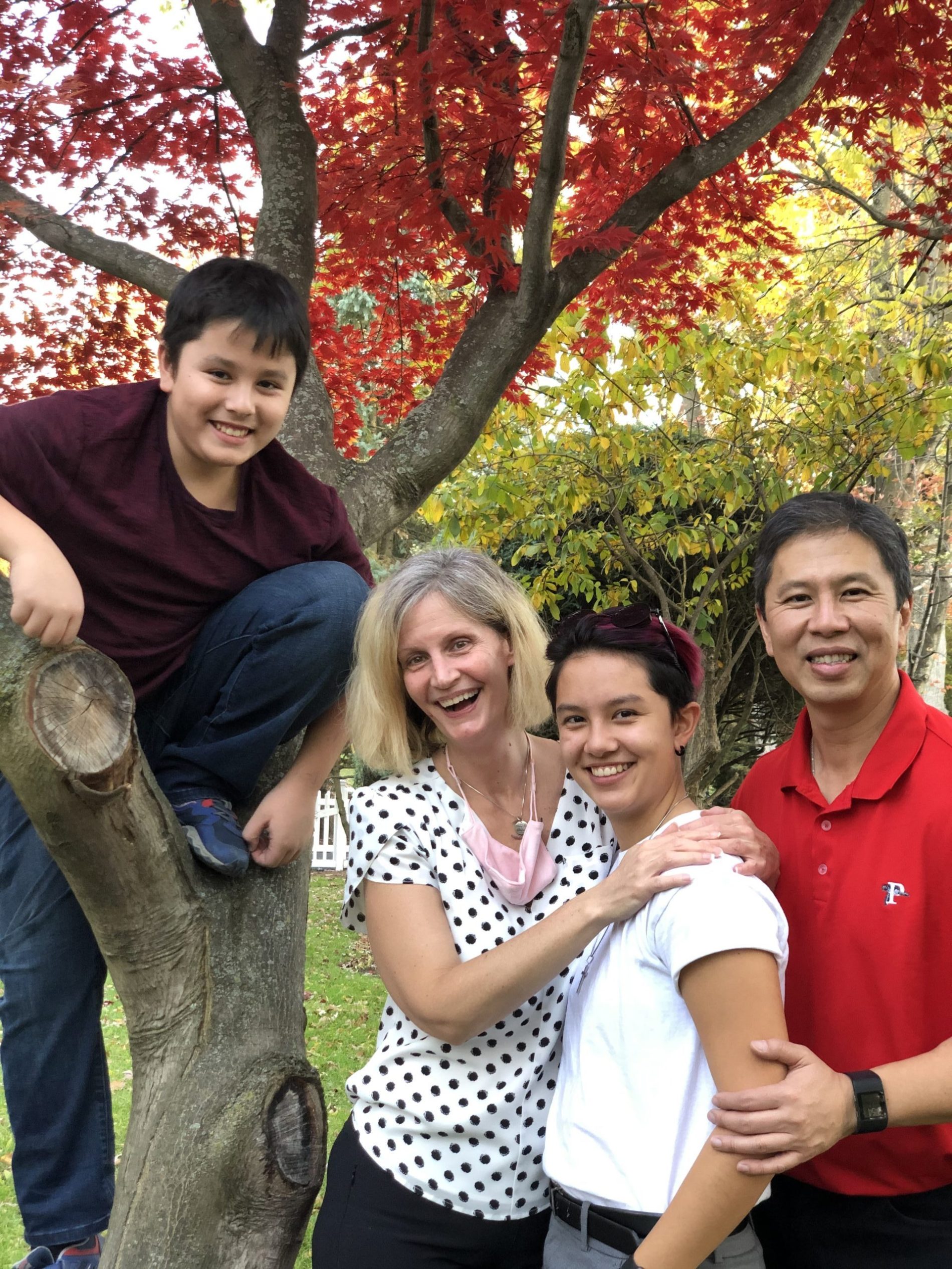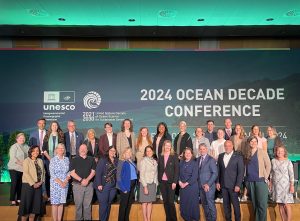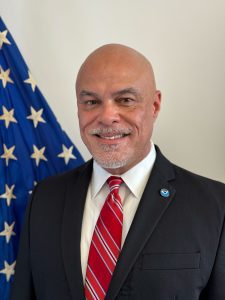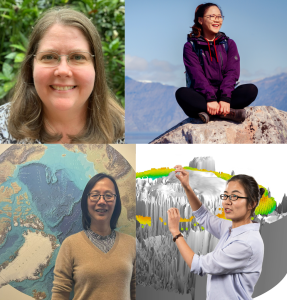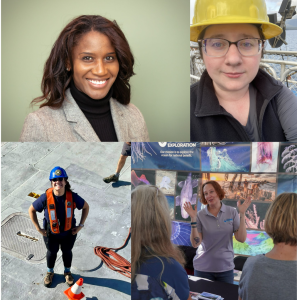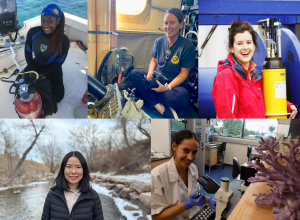By: Miguel Aristu
Shannon Louie serves as NOAA’s Cooperative Institutes (CI) Administration Office Director and describes her pathway to NOAA as a nonlinear journey that she embarked on once the 9/11 attacks completely changed her life. Lawyer by education but “weather geek” by nature, she decided to follow her passion: a career in earth system science. As a real-life example of the countless ways in which someone without a scientific background can impact innovative research, she delivers a great piece of advice for anyone interested in an environmental career: “Be kind, be the best version of yourself, and always be committed to commitment.”
What was your career path like and how did it lead you to NOAA?
My journey to NOAA was a little bit of a nonlinear path. I’m not a scientist; I am a lawyer, but I no longer practice. Before joining NOAA, I represented a large bank in its telecommunications transactions overseas. Then my life changed overnight. I was In New York City on 9/11. I lived about two blocks away from the World Trade Center and had to be evacuated when the attacks happened. We lost everything in our home and our apartment was inhabitable for months. Obviously, while I lost my stuff, there were thousands who lost their lives. It was definitely devastating but, considering what other people experienced, I felt so fortunate at the same time. Living firsthand such a catastrophic event changed my life.
We truly needed a change after that happened. Born in Queens, New York, raised in New Jersey, of course we moved to St. Paul, Minnesota, next. St. Paul was the likely next step since it was where I went to undergrad and law school. After a few false starts, I became a federal employee in 2002 as an equal opportunity specialist at HUD. Although I enjoyed and was passionate about what I did, I realized it was not my true passion. Turns out I was always a weather geek and, as I was approaching my 40s, I started looking for positions that would lie in my field of passion, which is weather, climate, or as I call it now – earth system science. I got my first position at NOAA in the Cooperative Institutes (CI) Program Office back in 2013.
What are Cooperative Institutes and why do you think they are so important to NOAA's mission?
NOAA’s Cooperative Institutes are NOAA-supported, non-federal organizations with established outstanding research programs in one or more areas that are relevant to the NOAA mission. Funded work must be directly related to NOAA mission science and requires substantial involvement between one or more research units within the CI and one or more NOAA programs. The purposes of the partnerships are research, training, education, and outreach. What makes CIs different from other NOAA cooperative agreements is the authority to use the personnel, faciliites and services of the CI. We call it our “special sauce!” CIs are important because they rouse collaboration and enable NOAA to make long term mission-related investments in research and its people.
What excites you the most about your current role?
Although I have only been in my current role since October 2020, I have been fortunate enough to serve the NOAA’s Cooperative Institutes in a multitude of roles for about five years now. What I am most passionate about is definitely the people. In the CI Program, we really do have the opportunity for hundreds of micro-relationships within our portfolio. Also, I am really thankful for my teammates in the CI Administration Office (CIAO). The program is complex, and I find much of my strength working alongside the people in the CIAO. We not only get to interact with the people but we are also able to see the science that results, and that is very fulfilling. Since we cover all facets of NOAA research, there is not one NOAA mission that we do not get to learn about, or have exposure to, or have the opportunity to help impact, and that certainly is a great driver that keeps me passionate.
What advice would you give to young people who identify as “weather geeks” like you that would like to pursue a career in environmental science?
The most important thing to keep in mind is that there are lots of different ways to impact the environmental field – it is not just about the applicable science. There are many environmental components to help effectuate that same mission, and I am a perfect example of that. So if it is your passion, do not give up. Just because you are not the mathematician, or you are not the scientist per se, or you are not the person that drops the float in the water, it does not mean at all that you cannot have a meaningful and impactful contribution to the cause. You can be the person who helps write that report, or the person who helps communicate the findings – the possibilities are countless. A very important piece not to forget is that there are many different ways to impact science, even without a scientific background.
It is also very important “to be committed to the commitment.” When you think you can’t do it and you want to quit, remind yourself that you made this commitment and you will find the strength to keep it. Personally, it can get very frustrating sometimes to see people not realize their own potential. Don’t let the fear of failure distract us from being the best version of ourselves in all aspects of life, not only work.
What do you hope to accomplish in the future?
It is a really exciting year in the CI Administration Office and I am really excited for the near future. Our office is new, but we have all been working together for a little bit now. Our office just got a new purpose from our NOAA Administrative Order and, with this new mechanism, we are really going to be able to provide support to the CI Program and watch that research flourish in a brand new way that will really empower collaboration.
Personally, I am also very excited about taking my new tools for adaptation that we learned during Covid-19. It is a fact that the workplace that we had prior to Covid and the workplace now are so different, and I am particularly delighted for how in our office and in our program we have been able to adapt, to encourage, and to lean on each other. I would definitely say that my main lesson learned during the pandemic has been being kind. One cannot say that people are the most important thing, but then not be kind. I am also confident that the other part of being kind is perspective in life, and by that I mean trying to see things the way other people see it.
So if we take these two pieces together – the new office I am working at and the incredible ability to adapt that we all have demonstrated – it is what makes me extremely excited for the future of the CI Office and NOAA.
Miguel Aristu is a 2021 summer intern at NOAA Research's Communications Office. He is a MSc candidate in Environmental Metrology and Policy at Georgetown University with a view to pursuing a career at the interface of science, policy, and communications.
